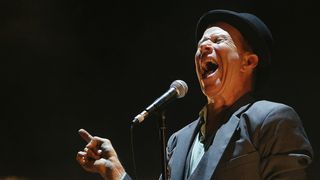"I can count on one hand the people who are legendary in my book," says guitar icon Steve Vai, "and Tom Waits is certainly right at the top. It's funny, though: When I tell people that I like Tom's music, it surprises them. They think that I sit home and listen to instrumental guitar music all day. That's certainly not the case, and it definitely isn't why I listen to Tom Waits."
Vai calls himself "an overzealous fan" of Waits' music, a body of work that, on the surface, couldn't be more different from his own. But while Waits' output - an ever-changing array of sprawling, abstract and stylistic narratives - might bear little sonic resemblance to Vai's hyper-kinetic guitar trompe l'oeils, both artists trade in their own variations of metaphysical mood music, highly idiosyncratic yet emotionally mesmerizing set pieces that never underestimate the intelligence of the listener.
"What I look for in music is artistry, sincerity, and simplicity," says Vai, "and Tom Waits has all of that. I want to make a connection to the creator. And even in complexity, there can be simplicity when it comes from an inspired place. That's what I get from Tom's music, and that's pretty special."
Let's start with how and when you came to discover Tom Waits' work.
"It's very bizarre. I didn't know Tom's work till I was in my late 30s. I had heard his name a lot, especially when I was with Dave Roth. Dave would always say things like 'Tom Waits did this,' or 'You know, like Tom Waits.' He was the one artist that Dave would mention with reverence. I would say, 'Yeah, yeah, Tom Waits,' but the truth was, I didn't know his music - I was just agreeing. And other people talked about Tom, as well, so I understood that a lot of people held him in very high regard.
"I was on tour with Whitesnake, and there was an opening band called Bad English, with John Waite from The Babys. Somehow, in my mind, I got the names mixed up. When I heard John Waite was going to be singing, I thought, 'Oh, great. Here's an opportunity for me to finally see him.' So I'm watching this guy, and I'm thinking, 'Well, he's not a bad singer, but I don't get it.' How could all of these people, whose views I really respected, be referring to John Waite? Not to take anything away from him, but he wasn't what I was expecting.
"Some years went by, and I was at a NARAS function - they're the Grammy folks - and a friend of mine who's a real music snob said to me, 'Hey, did you hear the new Tom Waits record?' He was referring to Mule Variations; and when this guy mentioned Tom's name, that's when I thought, 'OK, I've got something wrong here.' [Laughs] The next time I was in a CD store, I saw the Mule Variations album, and I realized it was a totally different guy.
"I bought the CD, put it in my player, and I tell you, it stopped me dead in my tracks. I was stunned into silence. I just listened to the entire CD, and then I went out and bought everything that he ever did. It just happens in life, where you resonate with a particular artist. Or it can be a kind of food or a fashion - you discover it and it gives you a whole new lease on life."

Waits, a Rock And Roll Hall Of Famer, performs during his induction ceremony, 2011 (Neil Young is to the right). © John A. Angelillo/Corbis
A lot of times, when somebody discovers an artist, they've at least heard one song or saw a video - there's something to go on, and they have an idea of what to expect. You were going into Tom's music cold.
"I had nothing to go with. I had done a little research, though, and read about some of his influences. The first song that came on was Big In Japan, and I thought, 'Ahh, that's the Captain Beefheart influence.' But there was something different about the sound of the record, the sound of the singing. I quickly discovered that it was only one sound in a myriad of styles, and with each song, every style was unique to Tom. The record completely grabbed me. It was from such a creative place.
"When I listened to his older records and I heard some of those ballads, they ripped my heart out. Honestly, I can't listen to them in public, because I just weep uncontrollably - for a long time. If I hear Kentucky Avenue or On The Nickel or Ruby's Arms - the list goes on. When he sings, he is completely connected."
To some of your fans who might be unfamiliar with Tom's work, what would you tell them that they're missing?
"I can only say what I'm getting; I can't speak to what they might be missing. The experience of music is a personal thing, and everybody has to find what pushes their buttons. There's great beauty in the diversity that the universe offers, and what works for one person might not work for another.
"I respond to inspired simplicity that is creative. First of all, Tom's voice is unique, and I don't even like to use that word, 'unique,' because it's a cliché, but I mean it in the truest sense. There's nobody like Tom. There's nobody that can sound the way he does and can change that sound in every fucking song.
The critic Daniel Durchholz described Tom's voice as being "soaked in a vat of bourbon - "
"'And hanging in a smoke house' - yeah, I know that quote. But that's one aspect of his voice; there's various rays that shoot from that one thing. At times he can be very smooth and on pitch, and other times it's so reckless that it sounds like he's on a treadmill, just gasping for air. But it's not just his voice: It's his insight, which is a big part of the package.
"In all of this, you have to mention his wife, Kathleen. She's his co-writer on many of those inspired lyrics. They are a team, and she has a comprehensive overview on many of the creative elements in Tom's contributions. What's funny is, when I'm listening to music with lyrics, it takes a particular poetic color to grab my attention. But with Tom's music, I listen to every single word because it paints such a beautiful story - or such a macabre story. Take Bone Machine - what a brilliant piece of work that is. How he can create macabre and capture it audibly - that's the third element to what he does, the ability to capture an atmosphere, a space that's almost onomatopoetic."

"I listen to Tom's music not because I want to be like it, but because it moves me," says Vai. © Massimo Valicchia/Demotix/Corbis
You discovered Tom Waits when you were in your late 30s. Do you think you would have appreciated him when you were younger?
"I think that I would have appreciated the coolness in his voice, but I don't know if I would have fully responded because there's a lot of artists who are deemed brilliant that I still don't get. Like Bob Dylan - I like him, but I don't get him. I like The Rolling Stones, but I don't get The Rolling Stones. When I was younger, I wanted Led Zeppelin, Deep Purple, Queen - everything else sounded wimpy to me. And for me now, the response meter for Tom Waits is off the charts. He's radioactive."
How would you say Tom's work has impacted your own - maybe not literally, but in an overall sense, perhaps philosophically?
"Tom has been unbelievably inspirational to me. He's 100 percent committed. When you watch him perform, he's fully present; he's in the moment with every single word. If you go to YouTube and watch a recent performance of him doing Raised Right Men - it's uncanny. He's completely present. That's what inspires me, not to be like him - I don't write music like him at all; I don't have that gene - but to honor that commitment. With him, he's there with very word, every syllable, every body movement. That's what does it for me. And he's not afraid to look awkward at times. To me, his body language when he performs is captivating. It adds to the beautiful artistic touch that he has."
A couple of big artists have had hits with his songs, but by a large, Tom remains a cult artist. Do you think that what he does is so unique or special that it's too much for a mass audience?
"That's a really good question, because I often wonder if more people heard stuff that was artistic, if they would respond to it. If you took pop radio and you slipped in a Tom Waits song and gave it the rotation that a Britney Spears song might get, I cannot help but feel that people would respond just as much, if not more. That's my feeling - I think we're all brainwashed, and we're force-fed a particular thing. That's why somebody like Tom might not sell millions and millions of records. I mean, I know he does well, and he has a career. His career is solid, and he's found his audience.
"That's the thing about great artists: They find the thing that's most obvious to themselves, what's most conscious and natural, and they put it out there and the audience comes. Sometimes it's a big audience, sometimes it's not, but Tom's fans are fiercely devoted to him. They don't go away.
"It takes a lot of courage to do what Tom does, to be that vulnerable and open. I think that's why a lot of guys like him might be shy in public: They allow you to see them in their most vulnerable creative moment, but the private life stays private."
Of course, he's worked with some very talented and creative guitar players over the years: Marc Ribot, Robert Quine, Duke Robillard -
"Joe Gore."
Joe Gore - absolutely.
"This is another area where Tom and Frank [Zappa] resonate similarly. They know how to find the thing in particular musicians that works best for their music. I've talked to some of Tom's musicians, and they've told me that the most important thing for him is the capturing of a certain atmosphere. Sometimes it doesn't matter if you're totally in tune, but you have to have a particular type of feel and a contribution that works with the kind of atmosphere that he's trying to capture. I think that's beautiful, and I think the guitarists that he has have always seemed to rise to that occasion."
Any particular guitar performances that stand out for you?
"Marc Ribot always has the right touch for me when it comes to Tom's music, especially the stuff on Real Gone - that's really beautiful playing. But then Tom can make records like Alice or Blood Money, and there's no guitar at all. You don't even know there's no guitar. He's able to do something like that and still retain his musical integrity."
The two of you are friendly - have you ever talked about working together?
[Laughs] "Well, I've had the privilege of meeting and talking to him and Kathleen on various occasions, and I have asked him about contributing on something once, but you know, he's very particular. He's always been very, very nice. We come from very different worlds. If the situation ever came up and it was organic, I'm sure that we would work together. A lot of times, people will say things like, 'Well, you're a big Jimi Hendrix fan, so if you could jam with anybody dead or alive, who would it be? It would be Hendrix, right?' And I don't really subscribe to that stuff.
"I don't know how I would contribute to Tom's work because I'm totally in left field. I'm sure that I could do something, but I don't know if it would be authentic to his music. And that's odd because his music is the music I listen to most of the time. But that's the thing: I listen to Tom's music not because I want to be like it, but because it moves me."
We've talked a lot about his music, but hey, Tom's not a bad actor, either.
"Oh, he's a great actor! He always finds the right part, and he contributes beautifully. I've seen everything he's ever done on film - everything - and with a couple of exceptions where I more question the director, he's always just perfect. When he's acting, he's the same way that he is when he's making music. He wears who he is on his sleeve. That's pretty rare."


